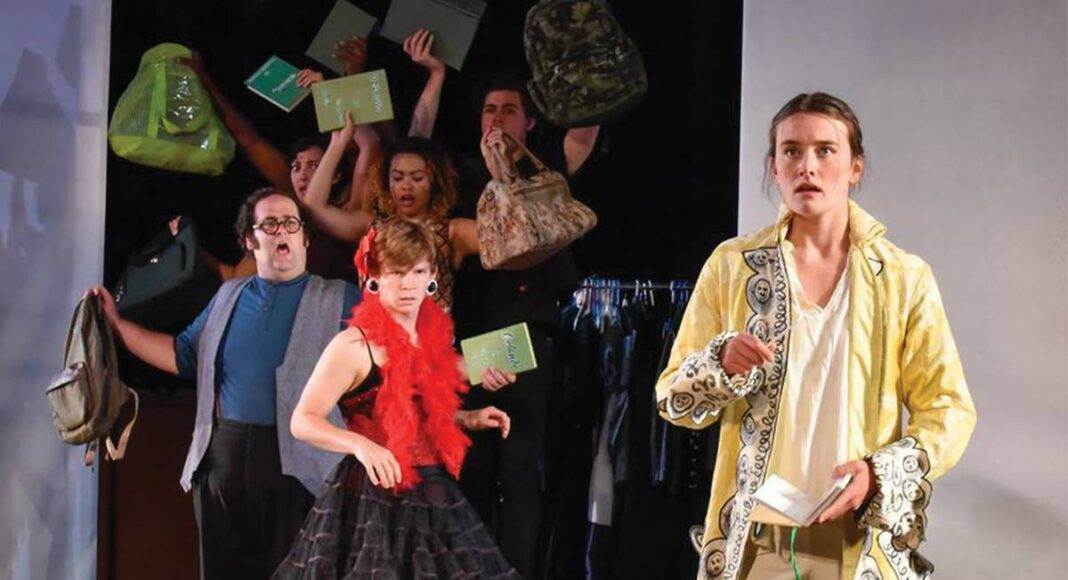A love letter to the reinvention of the Self—Orlando—tops off the inaugural season of Santa Cruz Shakespeare. Oh, the cunning of this choice to run alongside the gossamer mindgames of A Midsummer Night’s Dream and the gender transformations of Hamlet’s newly feminized leading role. In a parallel universe with Kate Eastwood Norris’ evolving Hamlet, Orlando scampered its opening-night way across a brisk two and-a-half hours of playful questioning and time tripping.
Tempting as it might be to describe this frisky entertainment as a funny feminist fable, it is much more. Peering into the cultural future, Virginia Woolf (and her accomplice playwright Sarah Ruhl) envisioned nothing less than the permeability of all genders and species, mutually inflecting each other. Even for those who haven’t read the great and funny bio-novel by Woolf, the play is legible throughout. The young and talented troop of SCS interns moves us swiftly through five centuries of musings and wildly romantic wanderings on the part of a young aristocrat who finds himself swept through time. An actor’s dream! Orlando’s progress is tracked by the gleeful actors—having fun changing costumes, accents, and genders throughout the fast-paced production. Never was cross-dressing so justified, nay required!
Every player is terrific, as is the mutating “set” constructed by the actors’ bodies and a few props here and there. But, for my money, the major duomo of the play is the delectable Daniel Fenton Anderson.
In her adaptation of the book, Ruhl has plucked key scenes from each of the centuries propelling Orlando ever forward toward “the present moment.” Each of the five short episodes evokes the spirit of its own age, and at breakneck speed.
In the 16th century, young Orlando is chosen—for his shapely legs—to be the favorite of Queen Elizabeth I, played with disco drag flourish (and a costume to match) by a confident Carson McCalley.
In the next century Orlando falls for mercurial Russian tomboy Sasha, played with scene-chewing swagger by Mayadevi Ross. Next comes an odyssey to Persia to forget love gone wrong, during which our hero wakes from a deep sleep only to discover that he has become … a she! So it is as a blushing socialite in ruffled skirts that Orlando greets the 18th century. Epiphanies follow. Orlando still possesses the memories and behavior of her time as a man, yet fleshed out in an emotionally ripe woman’s body.
It is in the 19th century that she falls in love with her true soul mate, the deliciously named Marmaduke Bonthrop Shelmerdine (Christian Strange), a sea captain unafraid to weep. All is as incomprehensible as it is spellbinding. Virginia Woolf peels away the binary stereotypes of male/female and then, as the play plunges into the 20th century, uncovers the myriad identities we each enact throughout our lives. Brilliant insights—we are many selves, and they are many gendered to boot—hang lightly on the shoulders of these hard-working actors.
Every player is terrific, as is the mutating “set” constructed by the actors’ bodies and a few props here and there. But, for my money, the major duomo of the play is the delectable Daniel Fenton Anderson, whose substantive body English and impeccable timing keep everything moving, everything crisp. Remarkable chops.
The lion’s share of the movement fell to the lovely/handsome Sarah Pidgeon as Orlando, who is called to stomp, flail, coo, storm, flirt, skate, and swoon her way through five centuries’ worth of revelations, personal as well as cultural. As the fluctuating “chorus,” the entire company takes turns narrating, as well as performing, the action we watch and hear.
With over-the-top wordplay and inventive DIY costuming, the actors move the fantasy in and out of dreaminess and slapstick. Ruhl uses this technique masterfully and we feel as if we are both reading, watching, and joining the action Woolf imagines. If Ruhl’s adaptation captures the feistiness but just misses the deep magic, well, for that, we have Virginia Woolf’s book itself.
I can think of no more perfect finale for this season’s suite of plays than the all-too-short Fringe run of Orlando. The final performance is Wednesday, Aug. 24, and if you can’t find a ticket then read the book with Norris’ Hamlet in mind. santacruzshakespeare.org.













